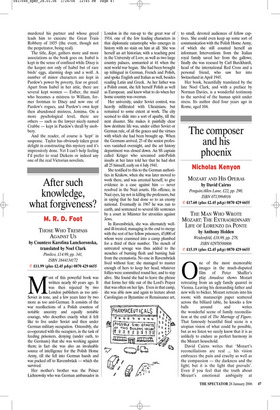After such knowledge, what forgiveness?
M. R. D. Foot
THOSE WHO TRESPASS AGAINST US by Countess Karolina Lanckoronska, translated by Noel Clark Pimlico, £14.99, pp. 341, ISBN 1844134172 ✆ £11.99 (plus £2.45 p&p) 0870 429 6655 Most of this powerful book was written nearly 60 years ago. It was then rejected by two London publishers as too antiSoviet in tone, and a few years later by two more as too anti-German. It consists of the war recollections of a Polish countess of notable ancestry and equally notable courage, who describes exactly what it felt like to live under Soviet and then under German military occupation. Ostensibly, she co-operated with the occupiers, in the task of feeding prisoners, denying (under oath, to the Germans) that she was working against them; in fact she was also an invaluable source of intelligence for the Polish Home Army, till she fell into German hands and was packed off to Ravensbrück — which she survived.
Her mother’s brother was the Prince Lichnowsky who was German ambassador in London in the run-up to the great war of 1914, one of the few leading characters in that diplomatic catastrophe who emerges in history with no stain on him at all. She was herself an art historian, with a teaching post in the University of Lvov, as well as two large country palaces, unmarried at 41 when the next world war began. She had been brought up trilingual in German, French and Polish, and spoke English and Italian as well, besides reading Latin and Greek. As her father was a Polish count, she felt herself Polish as well as European; and knew what to do when her home country was overrun.
Her university, under Soviet control, was heavily infiltrated with Ukrainians, but remained to some extent at work. The city seemed to slide into a sort of apathy, till the next disaster. She makes it painfully clear how destitute life was, under either Soviet or German rule, of all the graces and the virtues with which she had been brought up. When the Germans arrived, 25 of the senior professors vanished overnight, and the art history department was closed down. An SS captain called Krüger who screamed anti-Polish insults at her later told her that he had shot all 25 himself, early on 4 July 1941.
She testified to this to the German authorities in Krakow, when she was later moved to work there, and was arrested herself, to give evidence in a case against him — never resolved in the Nazi courts. His offence, in Nazi eyes, lay not in killing the professors, but in saying that he had done so to an enemy national. Eventually in 1967 he was run to earth, and sentenced to several life sentences by a court in Münster for atrocities against Jews.
In Ravensbrück, she was alternately welland ill-treated, managing in the end to merge with the rest of her fellow prisoners, 45,000 of whom were crammed into a camp plumbed for a third of their number. The stench of untreated sewage was thus added to the stenches of burning flesh and burning hair from the crematoria. No one in Ravensbrück lived without fear; she managed to master enough of hers to keep her head, whatever follies were committed round her, and to stay alive. She found she had to leave the phrase that forms her title out of the Lord’s Prayer that was often on her lips. Even in that camp, she was able now and again to lecture about Carolingian or Byzantine or Renaissance art, to small, devoted audiences of fellow captives. She could even keep up some sort of communication with the Polish Home Army, of which she still counted herself an informant. Interventions from the Italian royal family saved her from the gallows; finally she was rescued by Carl Burckhardt, head of the international Red Cross and a personal friend, who saw her into Switzerland in April 1945.
Her book, beautifully translated by the late Noel Clark, and with a preface by Norman Davies, is a wonderful testimony to the survival of the human spirit under stress. Its author died four years ago in Rome, aged 104.






















































 Previous page
Previous page